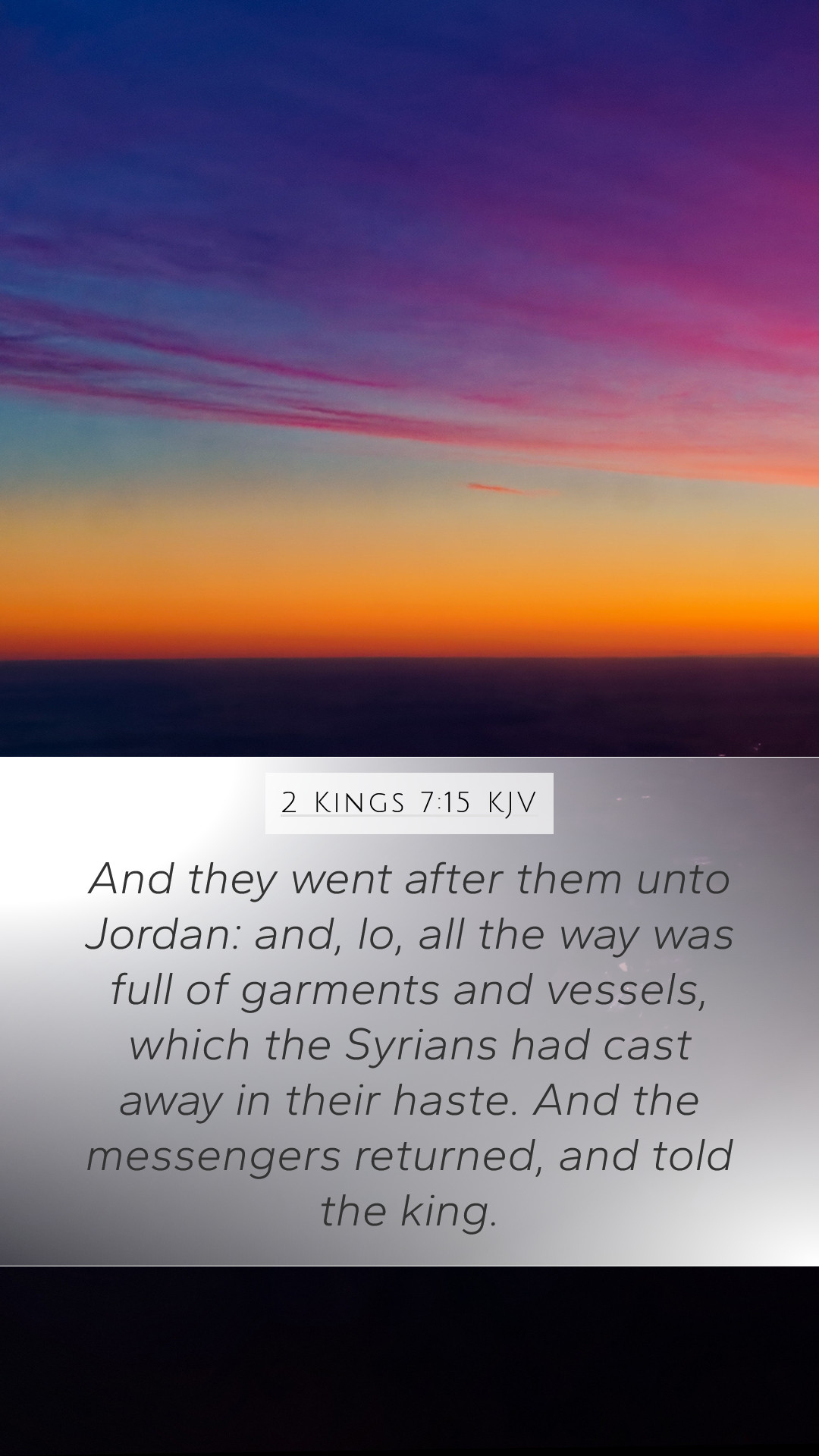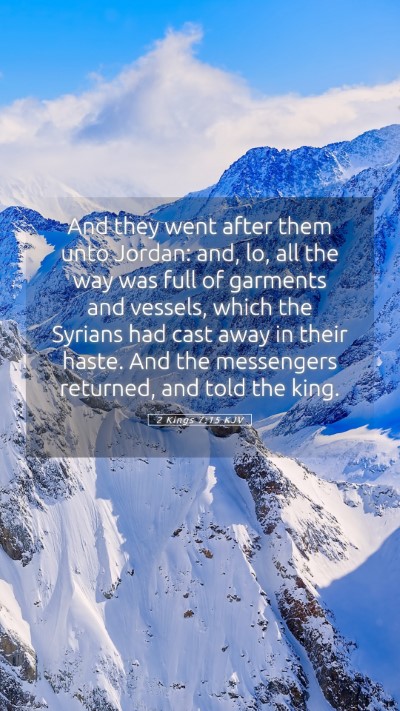Old Testament
Genesis Exodus Leviticus Numbers Deuteronomy Joshua Judges Ruth 1 Samuel 2 Samuel 1 Kings 2 Kings 1 Chronicles 2 Chronicles Ezra Nehemiah Esther Job Psalms Proverbs Ecclesiastes Song of Solomon Isaiah Jeremiah Lamentations Ezekiel Daniel Hosea Joel Amos Obadiah Jonah Micah Nahum Habakkuk Zephaniah Haggai Zechariah Malachi2 Kings 7:15 Meaning
What is the meaning of 2 Kings 7:15?
And they went after them unto Jordan: and, lo, all the way was full of garments and vessels, which the Syrians had cast away in their haste. And the messengers returned, and told the king.
2 Kings 7:15 Bible Verse Meaning
Bible Verse Commentary on 2 Kings 7:15
Bible Verse: 2 Kings 7:15
This verse recounts a significant moment during the siege of Samaria, a time of great desperation and famine. The context of 2 Kings 7 is crucial for understanding the fullness of this passage.
Contextual Understanding
The background of 2 Kings 7 is vital. The city of Samaria was under siege by the Arameans, leading to severe famine. The people were in despair, and a prophecy from Elisha had promised deliverance. In this setting, the lepers, who were outcasts, discovered the enemy's camp abandoned, an event that signifies God's miraculous provision.
Commentary Insights
- Matthew Henry's Commentary:
Henry emphasizes the grace of God in providing for those who are desperate. The lepers acted not out of bravery but necessity. Their discovery of the abundance in the enemy’s camp illustrates that God's mercy often comes in unexpected ways.
- Albert Barnes' Notes on the Bible:
Barnes highlights the significance of the lepers' actions. Their willingness to enter the camp represents the faith necessary to receive God's provision. This moment reflects a shift from despair to hope, showcasing God's power over dire circumstances.
- Adam Clarke's Commentary:
Clarke points out the irony that those who were marginalized (the lepers) were the first to experience God's deliverance. He underscores the biblical theme that God often chooses the weak to confound the wise, emphasizing humility and reliance on divine provision.
Meaning and Application
This verse carries profound implications for understanding divine intervention. It teaches that God can turn hopeless situations into incredible testimonies of His faithfulness. For those studying the Bible, this passage is an example of God's unfailing mercy and provision, urging believers to place their trust in Him even in dire circumstances.
Historical Context
The historical backdrop of Israel during this time is filled with conflict and moral decay. The famine reflects spiritual barrenness, and the deliverance symbolizes the restoration that God offers, both physically and spiritually. Understanding the setting is essential for a deeper grasp of the Scriptures.
Cross References
- 2 Kings 6:25: Discusses the extreme famine in Samaria.
- 2 Kings 7:1: Elisha’s prophetic word about the impending deliverance.
- Hebrews 11:6: Reflects on the importance of faith in God’s promises.
- Psalms 34:6: A reminder that the Lord delivers the distressed.
- Matthew 5:3: Illustrates the blessedness of the poor in spirit.
- 1 Corinthians 1:27: God’s choice of the foolish to confound the wise.
Conclusion
In summary, 2 Kings 7:15 serves as a powerful reminder of God's provision and sovereignty. The verse illustrates how God can work through unexpected people and circumstances to fulfill His promises. For anyone engaging in bible study, this analysis highlights key principles of faith, divine intervention, and the importance of recognizing God's hand in our lives.
Further Bible Study Insights
For those seeking Bible study resources, this passage opens avenues for discussions about bible verse meanings, especially in groups or studies focused on understanding difficult passages. The stories in Scripture encourage believers to engage with God's Word actively, fostering a deeper connection to His promises and teachings.


